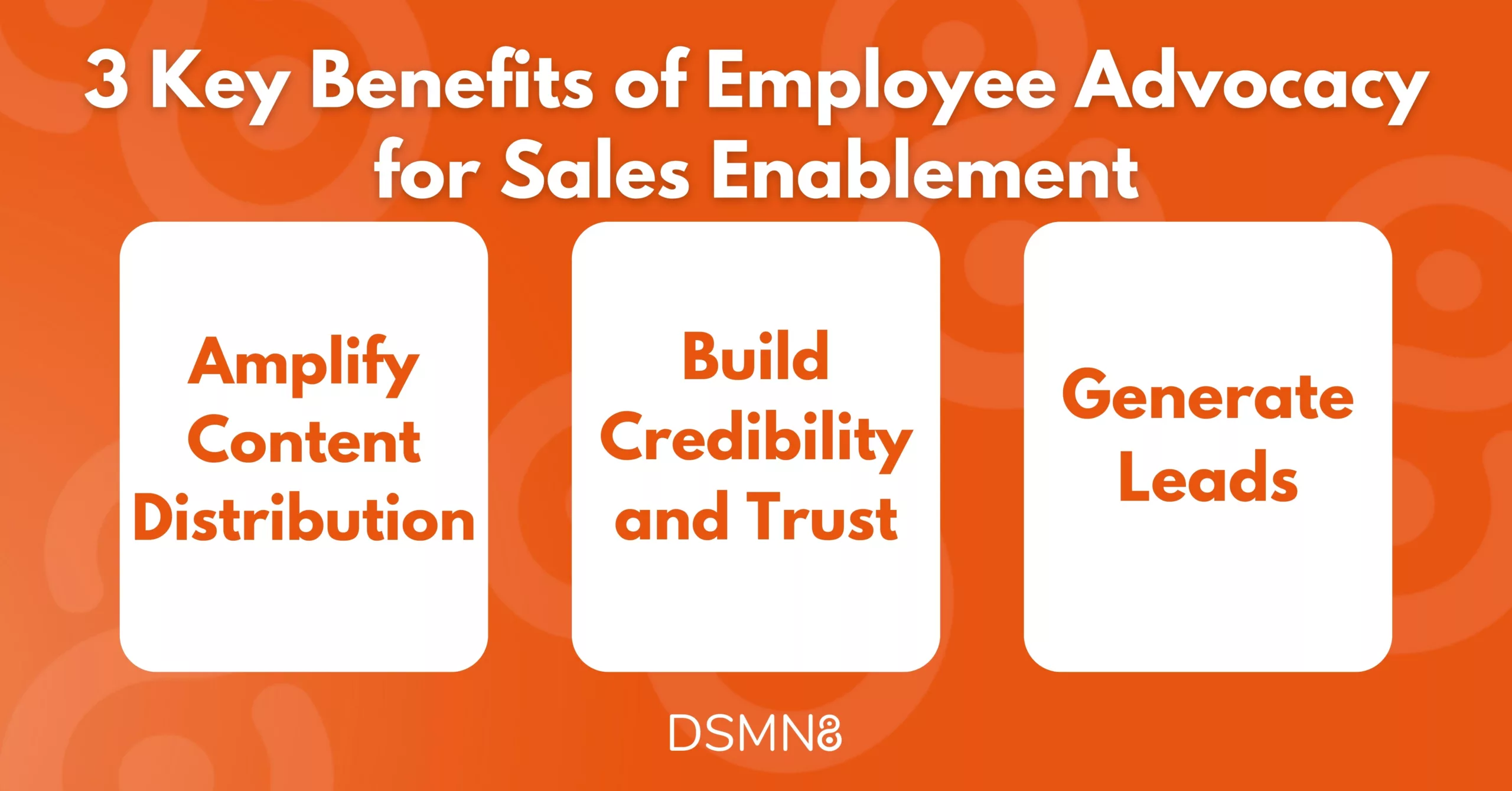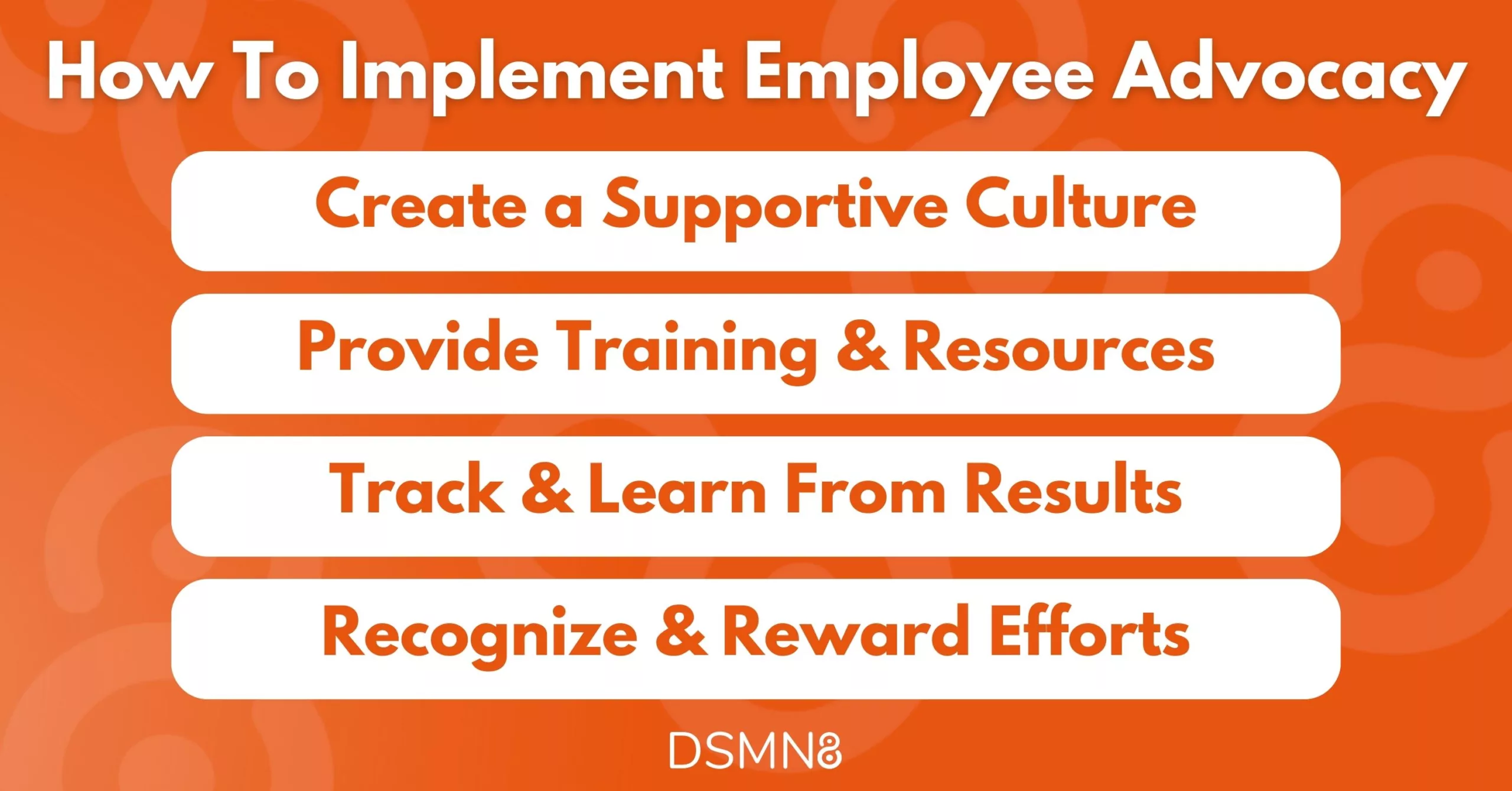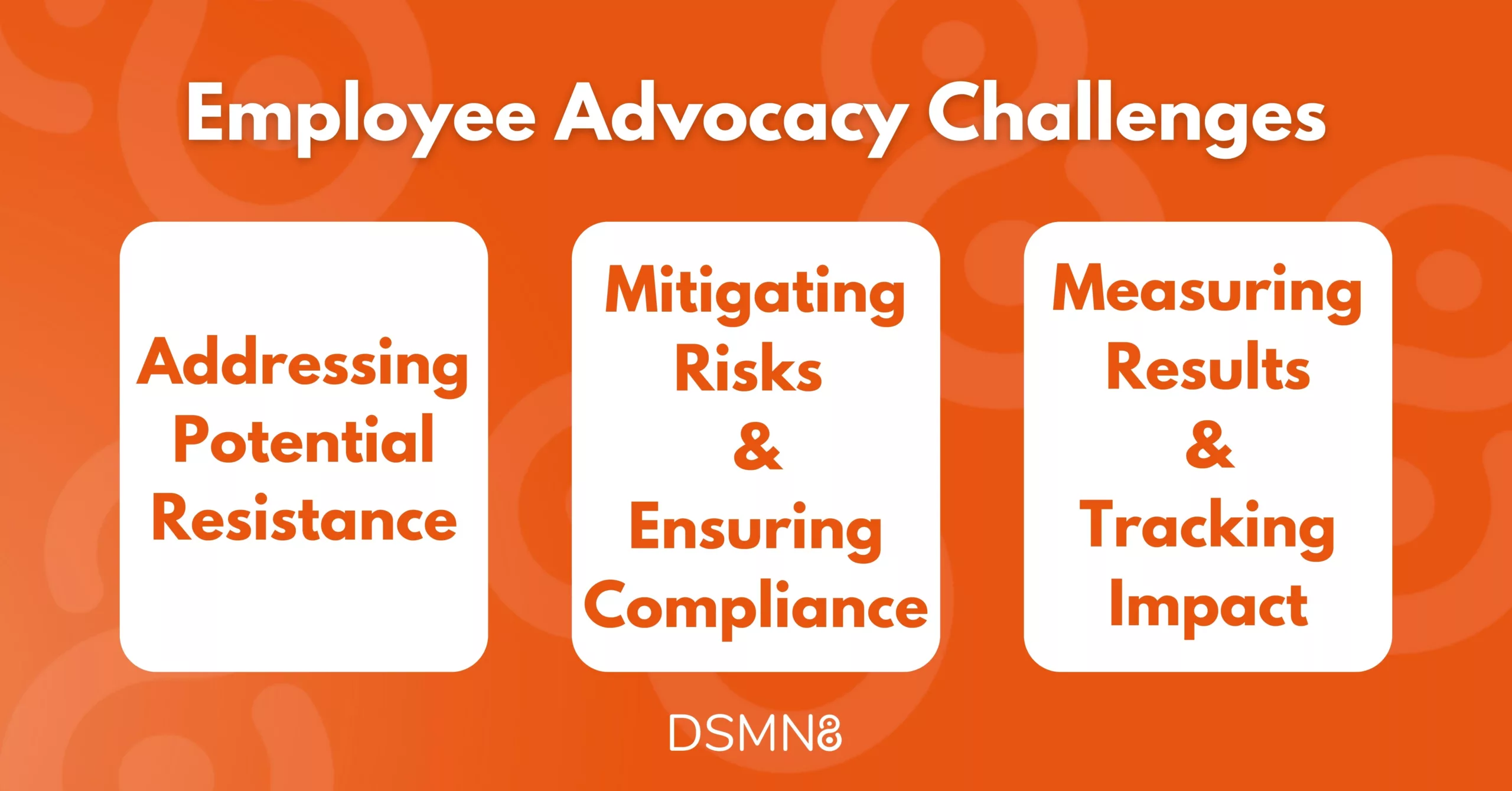
In the world of sales, where competition is fierce and expectations are ever-evolving, businesses are constantly seeking innovative ways to stay ahead.
How can you take sales enablement to the next level? Employee advocacy!
Find out how employee advocacy supports sales enablement, from expanding reach and credibility to fostering deeper customer connections and driving revenue growth 📈
The Importance of Sales Enablement for Businesses
Unlocking the full potential of your sales team isn’t just about having talented employees; it’s about providing them with the tools and knowledge they need to thrive.
So what is sales enablement? 🤔
Essentially, it’s the art and science of equipping your team with the right resources, strategies, and support to conquer the sales battlefield. It’s everything from sales training, coaching, and feedback, to providing resources and assets, like social media content and learning materials.
By investing in sales enablement and encouraging social selling, you’ll empower your sales force with Jedi-like abilities to connect with prospects and clients, overcome obstacles, and close deals like never before.

Once you’ve established a clear sales enablement process, you’ll find that onboarding new sales reps becomes smoother than ever.
Provide your recruits with all the resources they need to get them up-to-speed efficiently, and help them understand your products/services and business goals from the get-go.
While I’m talking about sales here, don’t make the mistake of thinking sales enablement is just for sales. Marketing should be involved too.
Remember, they’re often the people creating brand assets, educational resources, and social content for both employees and customers.
Alignment between sales and marketing is essential for social selling success, and sales enablement is the glue that holds the two teams together 🤝
The Concept of Employee Advocacy
So where does employee advocacy come in?
First, let’s define what advocacy is.
Employee advocacy is a marketing strategy that involves encouraging employees to promote and represent their company’s brand and values on social media.
The purpose of employee advocacy is to leverage the authentic voices of employees, in order to create a genuine connection with customers, attract top talent, and establish your company as an industry thought leader.
By harnessing the power of their personal networks, your advocates will increase brand awareness, enhance credibility, and drive positive business outcomes. 📈
I’m sure you can see how this aligns perfectly with social selling. No doubt, some of your best employee advocates will naturally be salespeople, as they have a vested interest in the success of an advocacy program.
I’ve already highlighted that sales enablement should ensure alignment between sales and marketing, and employee advocacy takes this a step further.
The Benefits of Employee Advocacy in Sales Enablement
By harnessing the power of employees as brand advocates, your company will experience a range of benefits that will directly impact your sales team and their results.
Here are three key benefits of incorporating employee advocacy into your sales enablement strategy 👇

1. Amplified Content Distribution
Employee advocacy is a powerful tool for expanding the reach and distribution of your sales content.
When employees actively share company content, such as blog posts, case studies, or product updates, it reaches a broader audience beyond your brand’s official channels.
This amplified content distribution helps increase brand visibility, attract potential customers (and employees!), and generate new leads.
2. Credibility and Trust
In today’s competitive business landscape, establishing credibility and trust with potential customers online is essential.
Employee advocacy plays a pivotal role in building credibility, as employees are seen as more authentic and trustworthy sources compared to traditional marketing messaging.
When employees share content that showcases their expertise and insights, it adds a human touch to the brand.
Prospects are more likely to trust recommendations and information shared by employees, leading to increased confidence in your company.
3. Lead Generation
Employee advocacy is a powerful lead generation tool for sales teams.
By empowering employees to share relevant content and engage with prospects on social media platforms, you can tap into employees’ networks to identify and nurture potential leads.
When employees share valuable content and interact with prospects on social, it sparks conversations, generates interest, and ultimately drives conversions.
The personal connections and relationships that employees have with their networks can significantly enhance the effectiveness of lead generation efforts, leading to higher-quality leads, and increased sales opportunities.
How To Implement Employee Advocacy in Sales Enablement
OK, so that was the why. But what about the how?
Implementing employee advocacy and using it for sales enablement isn’t a case of just telling your team to “be more active on social media” 🙄
Check out DSMN8’s guide to the first 60 days of employee advocacy for an in-depth strategy for starting your advocacy program.
In the meantime, here are the 4 main things you’ll need to factor in 👇

1. Create a Supportive Culture and Positive Mindset
One of the first things you’ll need to do is foster a supportive culture and positive mindset within your organization.
This involves ensuring that employees understand the value and impact of advocacy on sales outcomes.
Encourage a culture of collaboration and empower employees to become brand ambassadors. Let them know why advocacy benefits them too. Rather than positioning it as a new “task”, advocacy should be an initiative that people want to take part in.
By cultivating a sense of pride and ownership in the company’s mission and values, employees will be more inclined to actively participate in advocacy efforts. They’ll also drive better results, as the content they create will be more authentic!
Want some examples? Find out how some of the world’s biggest brands showcase company culture on social media.

2. Provide Proper Training and Resources
To maximize the effectiveness of employee advocacy for sales enablement, it is essential to provide employees with the necessary training and resources.
Develop a set of clear guidelines that outline the do’s and don’ts of employee advocacy, ensuring that employees understand boundaries and expectations. DSMN8’s social media policy template will help you get started with this. Be sure to provide ongoing support to address any questions or concerns.
Educate employees on the best practices of social selling and how to effectively share company content. Equip them with the knowledge and skills to engage with prospects, build relationships, and leverage social media platforms strategically.
Remember that not all of your employees are “digital natives”. Get marketing to provide some social media training!
To take this to the next level, provide employees with access to a library of curated content and marketing assets that they can easily share with their networks. Using an employee advocacy platform like DSMN8 streamlines the process.
3. Track and Learn From Results
While you might be winning at social media on your brand channels, keep in mind that the content you need for employee advocacy will be different.
People follow people for their insights, expertise, and authenticity.
So, although your sales team will be sharing company content, it needs to be balanced with their own unique takes and perspectives.
Rather than guessing what the algorithm wants this week, take a data-driven approach. Try out different content formats, styles, tone-of-voice, and learn from the results.
Regularly review and evaluate the performance to make informed decisions and refine your approach. Use the insights gathered to optimize content creation, identify top-performing advocates, and find opportunities to enhance sales enablement.
4. Recognize and Reward Efforts
Acknowledge and appreciate the efforts of employees who actively participate in your advocacy program. The best advocacy program managers engage with the content employees share, and recognize their work.
Celebrate their contributions through internal communications, social media shout-outs, or even incentives like gamification or rewards programs. You can use an employee advocacy platform to make this easier, but it can also be done manually if you’re running a small program.
By highlighting and rewarding employee advocacy efforts, you create a positive feedback loop that motivates employees to continue advocating for the company.
Overcoming Challenges
While you can clearly see why employee advocacy helps sales enablement, you’ll need to sell the concept to others within your organization. Getting buy-in from your colleagues is essential for success.
Here are 3 common challenges companies see when starting employee advocacy, and how to overcome them 👇

1. Addressing Potential Resistance or Skepticism
When implementing employee advocacy as part of your sales enablement strategy, you’re likely to meet some resistance from employees… especially if prior to this point, your company had a “don’t post on social media” policy.
Some may be hesitant to participate due to concerns about privacy, time commitments, or a fear of blurring the line between personal and professional boundaries.
To overcome these challenges, communicate the benefits and value of employee advocacy, emphasizing how it can enhance their personal brand, professional growth, help them reach their KPIs, and contribute to the overall success of the sales team.
Let them know you’re not expecting them to share content on their personal social media accounts, but rather, professional platforms like LinkedIn.
The key is to get the leadership team onboard, to lead by example. Once sales reps start seeing the VP of Sales posting frequently to LinkedIn and starting conversations, they’ll want a piece of the pie! 🥧
Address any concerns transparently, provide training and support, and showcase success stories from early adopters to inspire and alleviate doubts.

2. Mitigating Risks and Ensuring Compliance
It’s crucial to establish guidelines and policies that ensure compliance with industry regulations, data protection laws, and confidentiality agreements.
This is especially important for regulated industries like pharmaceuticals and financial services.
Educate employees about their responsibilities and the importance of respecting client confidentiality, intellectual property, and ethical practices on social media.
Using DSMN8 enables you to implement a robust system for content approval. You can provide employees with easy-to-use tools that facilitate compliance, while streamlining the sharing process.
DSMN8 ensures that employees feel confident and empowered to engage in advocacy, rather than fearful of making a mistake!
3. Measuring and Tracking the Impact
To effectively measure the impact of employee advocacy on sales enablement, it’s necessary to establish KPIs and implement tracking mechanisms.
Track metrics like lead generation, conversion rates, sales pipeline acceleration, and revenue attributed to employee advocacy efforts.
Utilize analytics tools and social listening to gain insights into audience engagement, content performance, and the reach of employee-shared content. 📈
Regularly analyze and report on these metrics to assess the effectiveness of the employee advocacy program, then make data-driven decisions to optimize your sales enablement strategy.
In Summary
Employee advocacy is a game-changer for sales enablement.
It strengthens sales effectiveness, boosts content visibility, establishes credibility with a human touch, and helps generate high-quality leads.
It’s a win-win approach that not only drives sales growth but also fosters a culture of collaboration, engagement, and shared success within your organization 🤝
Embrace employee advocacy as a strategic pillar of your sales enablement strategy, and witness the transformative power it brings to your business!
Ready to get started with the #1 employee advocacy platform?
Wondering how active your team already is, and how this compares with your competitors?
Related Podcast Episode 🎧
Emily Neal
SEO and Content Specialist at DSMN8. Emily has 10 years experience blogging, and is a pro at Pinterest Marketing, reaching 1 million monthly views. She’s all about empowering employees to grow their personal brands and become influencers.


